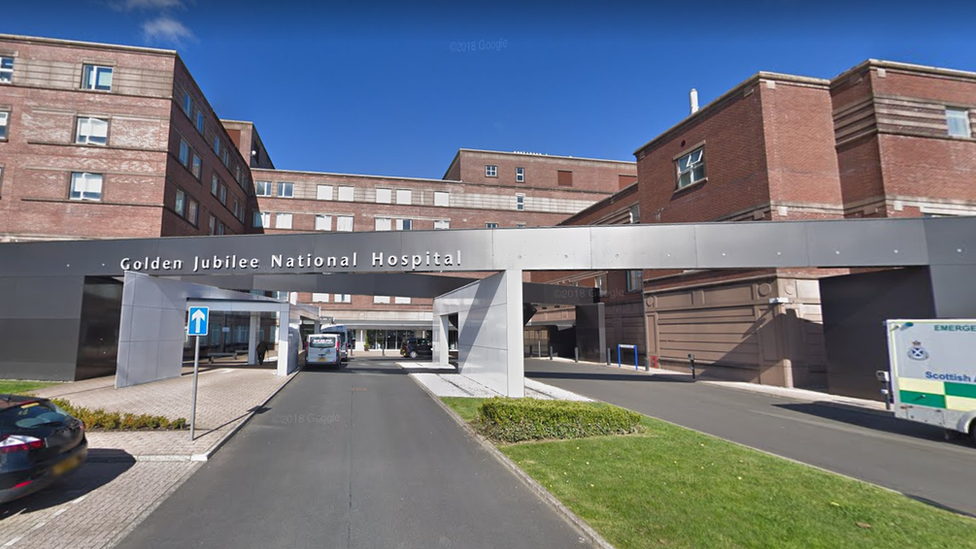Coronavirus: Scheduled treatment resumes at NHS Golden Jubilee
- Published

The Golden Jubilee Hospital will be used to help clear the backlog of non-urgent operations
Scheduled heart and lung procedures, hip and knee replacements, cataracts, and a range of diagnostics tests are starting up again at the NHS Golden Jubilee hospital in Clydebank.
It is hoped the move will help accelerate treatment for patients whose planned care was put on hold during the coronavirus pandemic.
Across the country, more than 27,000 people have not been able to have their planned hospital treatments over the past 14 weeks, according to figures from Public Health Scotland, external comparing scheduled hospital admissions in that period with the average for 2018/2019.
In a pre-Covid world, the NHS grappled with long waiting lists.
Now, with three months of paused treatments and operations, they not only have a backlog of patients, they need to factor in a new, slower, way of working with social distancing, time to thoroughly clean equipment between patients and changing protective clothing.

Urgent surgery has continued at NHS Golden Jubilee throughout the pandemic
Health boards around Scotland refer patients to NHS Golden Jubilee to take the pressure off their waiting lists and get patients treated more quickly.
So re-introducing planned treatment here will help reduce the backlog.
Jann Gardner, chief executive of NHS Golden Jubilee, said the hospital would be doing more than it previously did - with operations six days a week, instead of five.
"We have created two new wards and will be opening these as soon as possible," she said.
"We need to take precautions, so the pathways as you come into the hospital will feel a little bit different. But because we have single rooms, we are well laid out and the care that has been taken means that actually we will be able to do a high volume.
"So we will do, not only the services we did before, but also additional cancer services."
Staff at the Golden Jubilee have already been contacting patients on their lists. They will receive information about how they are trying to ensure the hospital is safe.
Part of the strategy is that patients coming in for treatment must self-isolate for 14 days with their family, unless they are living alone or can isolate within their household.
They will then be tested for Covid-19. The procedure can only go ahead if they test negative.
When they arrive at the hospital it they will be issued with a mask, they will follow a socially-distanced one-way system, staff will be wearing masks and they cannot have visitors as normal.

'The pain is getting worse and worse'

Eileen Wathew, who is 54, is among the patients across the country waiting to hear what is next for them.
She has osteoarthritis in her knee and was put on a waiting list for surgery last year.
Every step she takes is a reminder of the pain and she says her condition has deteriorated the longer she has waited. As her operation is not classed as urgent, she has to wait it out.
"I have no cartilage left in my knee at all so I'm in a lot of pain with it and unfortunately it is just getting worse and worse," she said.
"I was told it would be a two or three-month wait but then the pandemic hit and when I was just about due for surgery, unfortunately it wasn't to be."

At the Golden Jubilee there was a waiting list of 1,500 for joint replacements alone before the coronavirus pandemic.
Orthopaedic surgeon Joe Baines said: "It's going to be a challenge. Of course we will need to make up for the shortfall but it might take us many months to get there.
"We will certainly do everything we can and we can still provide patients with a good result.
"The worst thing about it is the pain that people have endured over the last few months, and also those not on waiting lists yet who would have been - they are going to have to wait longer."
The phased restart at the Golden Jubilee is part of the wider mobilisation of the NHS, with every health board having its own plan.
At NHS Forth Valley, some local services have already restarted, including the colonoscopies, X-rays, and CT and MRI scans for patients whose routine or less urgent scans were postponed.
But they stress that patients should not expect "business as usual" while they are also working to minimise risk of coronavirus transmission.
So patients are being asked to be patient even if it is the last thing many will feel after a long, possibly painful wait.

RISK AT WORK: How exposed is your job?
EXERCISE: What are the guidelines on getting out?
THE R NUMBER: What it means and why it matters
RECOVERY: How long does it take to get better?
